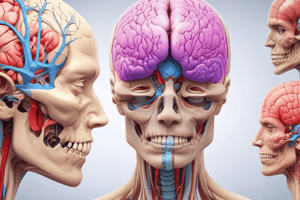Podcast
Questions and Answers
How many pairs of conventionally considered cranial nerves are there?
How many pairs of conventionally considered cranial nerves are there?
- Twelve (correct)
- Ten
- Thirteen
- Fifteen
Where do the olfactory nerves and optic nerves emerge from?
Where do the olfactory nerves and optic nerves emerge from?
- Brainstem
- Cerebellum
- Cerebrum (correct)
- Spinal cord
Which part of the nervous system are the cranial nerves considered to be components of?
Which part of the nervous system are the cranial nerves considered to be components of?
- Peripheral nervous system (PNS) (correct)
- Central nervous system (CNS)
- Autonomic nervous system (ANS)
- Enteric nervous system (ENS)
How are the cranial nerves different from the spinal nerves?
How are the cranial nerves different from the spinal nerves?
Which cranial nerve is more accurately considered part of the central nervous system (CNS)?
Which cranial nerve is more accurately considered part of the central nervous system (CNS)?
Flashcards are hidden until you start studying
Study Notes
Cranial Nerves
- There are 12 pairs of conventionally considered cranial nerves.
- The olfactory nerves (cranial nerve I) and optic nerves (cranial nerve II) emerge from the forebrain.
- The cranial nerves are considered to be components of the peripheral nervous system (PNS).
Cranial Nerves vs. Spinal Nerves
- Cranial nerves emerge from the brain, whereas spinal nerves emerge from the spinal cord.
- Cranial nerves transmit information To/From the head and neck, whereas spinal nerves transmit information To/From the rest of the body.
Unique Cranial Nerve
- The olfactory nerve (cranial nerve I) is more accurately considered part of the central nervous system (CNS) due to its unique function and anatomical location.
Studying That Suits You
Use AI to generate personalized quizzes and flashcards to suit your learning preferences.




